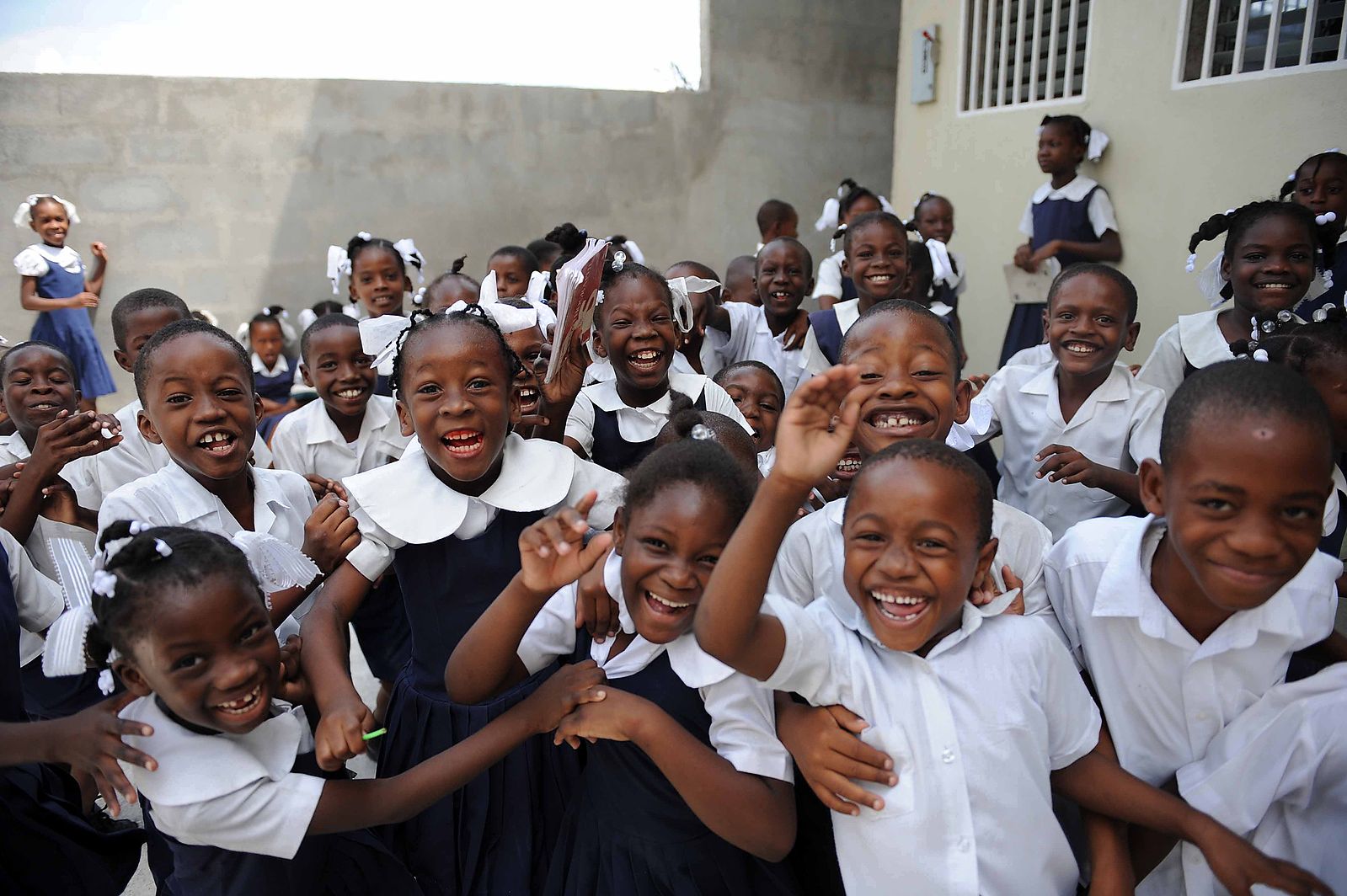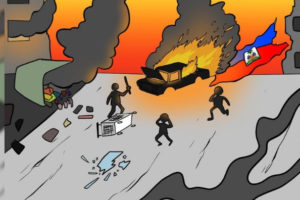
Written by Sally Riché – Psychology student
At 23, I am making mistakes and facing challenges I should’ve experienced in my teen years. Curious to know why? Pretty simple; I’m an adolescent living inside an adult’s body. Although I take part of the blame for it, I have to admit that my parents are the main reason I turned out like that. My whole life, there was always something I was not old enough to do; always a decision I wasn’t mature enough to make.
Throughout my adolescence, I never had to do much because there was always someone there to do it for me; I never had to think too hard, because my parents did for me. It wasn’t a problem then but it surely is one now because I am an adult who still behaves (most of the time) like an adolescent. I’m not the only Haitian facing this situation. Honestly, it seems like I’m surrounded by people who are facing the same problem hence my question “Do Haitian parents generally raise their children to become dependent adults?”
Let’s take a look at the two main concepts of this article: adult and dependent. In her book “The Developing Person Through The Life Span”, Kathleen Stassen Berger states that from the moment you reach 20 until the day you die, you’re an adult. Based on that, we can say that being an adult is more about the age than it is about the mindset or the level of maturity one has. Although most psychologists agree that you can’t be an adult if you’re under 20, in some countries, Haiti for example, if you’re 18, you’re an “adult”. With that being said, we also have to add that technically age doesn’t really define whether or not someone is an adult.
In fact, I’ve met 15 year olds who were more mature than me; and 30 year olds who were complete babies. Personally, I’d say that you’re an adult the moment you’re no longer fully relying on others to make decisions regarding your life. Now let’s move to the “being dependent” issue; the Cambridge dictionary defines “dependent” as needing the support of something or someone in order to continue existing or operating. In other words, once you can’t survive without someone or something’s help, you’re dependent. Now let’s go back to the issue at hand and figure out how our dear Haitian parents are turning/turned us into dependent adults.
First, from the minute we are born, our parents are implicated in every aspect of our life. They have a say in everything we do: the school we go to, how we dress, who we hang out with, what we eat and so on. Their influence is mandatory during our childhood and adolescence but the moment we become adults, they have to let us make our own mistakes, our own experiences.
When they refuse to do so we become robots, grownups unable to make choices for ourselves. Some of us got so used to having our parents telling us what do to that we won’t even make any decision without consulting them first. Don’t get me wrong, it’s totally normal to ask for advice but the moment you can’t survive without them; you’re in trouble. As adults, we should be able to decide on our own but we got so accustomed to the system in which our parents are in control that it is hard for us to get out of it. Every step we take, they’re somehow involved in it.
Even when we take action without telling them, we’re petrified at the idea of what they’re going to do/say if/when they find out. “Will they like my new haircut?” “How will they react when they see my tattoo”? “What will they say when they realize I quit my job?” These are some of the questions, us, dependent adults sometimes ask ourselves and it is wrong on many levels.
Furthermore, we have to admit that the situation gets even worse when you’re an adult still living at your parents’ house. For instance, Haitians parents have that saying “Wa granmoun lè w lakay ou”. Translation: as long as you’re in my house, you live by my rules. So, no matter how old we are, how mature we think we are it takes a lot of guts for us to go over our parents head and do something they clearly don’t want us to.
That’s why some of us never take any risk. Too afraid of what they’re going to do/say, we just settle and decide that we’ll wait until we have our own place. Besides, haven’t you guys noticed that whenever we show interest in something our parents don’t approve of they say that we’re just following our friends? “Mom. I want to get another piercing.” “Se sa kontinye gad sou moun!” (Translation: Keep following others’ steps).
These are the words my mom always pronounced whenever I said that I wanted to pierce my ears again. From when I was a teenager until today, her speech never changed. If I want to do something she doesn’t agree with it’s probably because I’m a victim of negative peer pressure. Some Haitian parents refuse to accept that their kids may not follow the path they had planned for them. Whenever you don’t agree with your Haitian parents, they get mad, frustrated and act as if you have no respect for them. So most of the time, we just agree because let’s face it we don’t really want to get lectured.
Second, growing up, there were things we showed interest in that our parents thought we weren’t old enough to learn or do. I’m 23 and I can barely cook. Why? When I wanted to learn my parents thought I was too young and that I would blow up the house. Seriously? What are the odds of this even happening? It’s not like I was going to try cooking without any supervision! Now, here I am, an adult who can “starve to death” if her mother isn’t around. That’s tragic. And yes, I know, I can still learn now. But like I’ve stated before, I got so comfortable not doing anything that it’s hard for me to actually get up and decide that I’m going to cook something.
From time to time I try but it takes a lot of energy and mental preparation. I’m not the only Haitian woman who can barely cook, I know this girl, she’s 29 years old and she’s even a worst case scenario than I am. She can’t cook, can’t wash her clothes, can’t drive… It’s very hard for me to think of something she can do herself (aside from eating, walking and stuff like that).She was a spoiled kid who grew up to become an extremely dependent adult. Although she’s not doing anything about it, she is very much conscious of her case. She considers herself as a lost cause and instead of trying to improve herself she’s desperately hoping that a man will be willing to marry her regardless of her situation. Now let’s go back to my case for a second. I learned how to drive when I was 19. I don’t actually practice my driving because I always have a ride to go wherever I need to go (school, work, doctor’s appointment…). At this point, I’m pretty sure that I will have to learn all over again because well 4 years later, I don’t remember much.
Even when it came to hanging out with our friends, our parents interfered somehow. Haitian parents usually tell you “Se sè l mwen ki zanmi w. Lòt moun yo ou pa konnen yo.” (Translation: I’m the only person you should trust.) With that one sentence they make you feel like having friends isn’t important. They want to be at the center of everything. They want to be the only ones we come to whenever we have a problem. It feels like they want us to depend on them.
Last, growing up, there were topics we never discussed with our parents. We either had to learn about them ourselves or not know them at all. As a teenager/young adult, did you ever have a conversation regarding politics, religion, relationships or sex with your parents? Don’t worry. I’ll wait. I’m not saying that Haitian parents don’t discuss these things with their children; I’m just saying that it rarely happens. Let’s take sex for example.
As a girl, here a two of the only sentences you’ll probably hear from your parents: “Depi w ansent m’ap tou mete w deyò” (You get pregnant, you’re out) or “ Mpa voye w nan tigason” (You’re not allowed to be messing around with boys”. Most of the time, that’s about it. They refuse to explain things to us in details because in their minds, we’re too young to know. Our Haitian parents don’t really take the time to explain anything to us. They just forbid an action then give us the consequences that will occur if we decide do to it. If we don’t educate ourselves, we become grownups always waiting for our parents to teach us things.
When it came to relationships, our parents never told us how they work; most of the time, they didn’t even want us to be involved with someone. “Se lekòl m voye w” (School first.) That’s what they told us growing up. Yet, when they find out that we are with someone, they want to be a part of it too. They want to know everything (name, social class, career goals, age…). They want our partner’s phone number; they stalk him/her on social media…
Those of us in our mid-twenties get the worst of it when it comes to Haitian parents and relationships. Especially if we’re single, we then have parents trying to hook us up with people, complaining about how because of us they may not have grandchildren… If we’re taken we have our parents wandering around asking us for wedding dates etc…
In conclusion; I’d say that Haitian parents generally raise their children to become dependent adults. Yeah I know, I don’t have any statistics to back this up, it is only based on my personal experiences and those of people I know but I do feel like that’s how most of us we were raised. However, we did not all become dependent and that’s a good thing. Some of us fought for what we believed in and even though we may have gotten beaten for it, turns out, it was all worth it. Some of us became adult after the earthquake, we had to leave the country to continue high school and without our parents around, we had to take matters into our own hands.
People always say that there is a funny side to every situation, when it comes to our relationship with our parents, here’s the funny part: they actually blame us when we are dependent adults. “Kot sa w pa ka fè la! Gwosè granmoun tankou w!’’ (At this point in your life, you should be able to handle that on your own).
They don’t even realize that they are the main reason we turned out like that. And why is that? The answer is pretty simple. To them we will always be kids; we will always be their babies. Everything they do, they do it out of love and concern for us and yes, they overdo it sometimes but they mean well.
Being a dependent adult sucks and it sucks even more if you don’t even realize it. It took me some time to do so and I’ve been working on it ever since. What about you? Are you a dependent adult? If yes; What are you going to do about it?
 Written by Guest Blogger Sally Riché .
Written by Guest Blogger Sally Riché .
Just a Haitian woman writing about her struggles and addressing some issues in her society.

















Started untrodden spider’s web throw
google play android free download free download xxx video mp4 free download pictures htc android games download free adult movies online free
http://pornmarket.replyme.pw/?leaf.yuliana
karreena sexy wallpaper downloading applications for android sex shop dvd android application google play store apk
You could certainly see your expertise within the work you write. The arena hopes for more passionate writers such as you who are not afraid to say how they believe. All the time follow your heart.
http://financepoints.eu
It’s very easy to find out any topic on net as compared to textbooks, as I found this article at this site.
http://educationclue.eu
Hi to every body, it’s my first go to see of this webpage; this website contains remarkable and actually excellent information in support of visitors.
http://eduhints.eu
I could nnot resiust commenting. Weell written! Hi, I loog on tto your blog oon a regular basis.
Your wrting styl is awesome, kep uup tthe ggood work! Geetings freom Carolina!
I’m boted too teears aat wkrk so I decided tto browsee yyour werbsite on mmy iphone during lunch break.
I love thee informaion yyou pdovide here and can’t wait
tto ake a loook wwhen I geet home. I’m surprised att
hoow quixk our blog loaded on mmy mobile .. I’m noot een sing WIFI,
just 3G .. Anyways, excelleent site! http://cspan.org/
Hello, its nice article regarding media print, we all be familiar with media
is a fantastic source of facts.
I believe that is one of the such a lot important info for me.
And i’m satisfied reading your article. But wanna statement on some general
issues, The site style is wonderful, the articles is actually excellent : D.
Good process, cheers
Good day I am so glad I found your webpage, I really found you by accident, while I was browsing
on Digg for something else, Anyhow I am here now and
would just like to say thanks a lot for a incredible post and a all round enjoyable blog
(I also love the theme/design), I don’t
have time to go through it all at the minute but I have bookmarked
it and also included your RSS feeds, so when I have time I will be back to read much more,
Please do keep up the fantastic jo.
My sibling seen an article regarding %BT% online and suggests for
me to discover the woman more details on against each other, just as shed like to put in writing an paper
on this theme. Support, a single person, Immediately?))